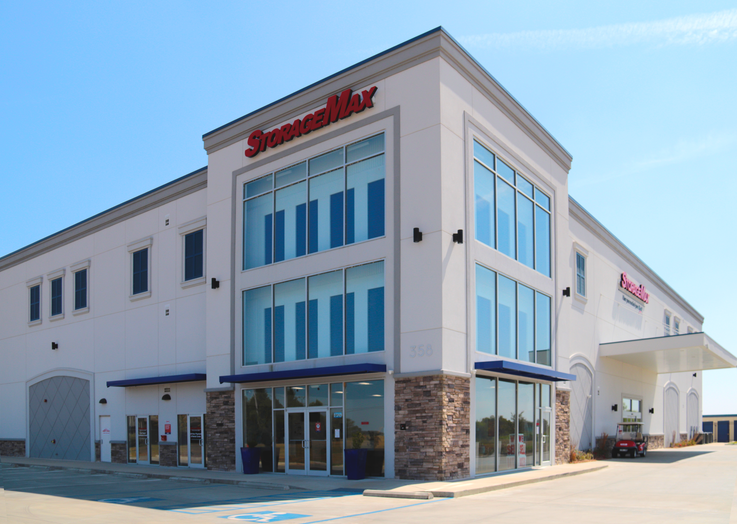10 Federal Drones Keep Unmanned Storage Facilities Safe
Many in the self storage industry have begun to explore new and emerging technologies in order to keep their facility operating 24/7, even if there’s no one on-site 24/7 – or even at all. Remote managed properties, or unmanned facilities, are becoming more popular, and no one understands this better than 10 Federal Storage.
10 Federal Storage, which operates 20,000+ storage units at more than 75 locations across 14 states, has embraced automated storage almost since day one. “Our first property, which we bought in 2015, had a manager on site. However, there just was not enough activity to justify that,” says Andrew Capranos, President of 10 Federal Self Storage. “It did not make sense to be paying someone to play on their phone all day.”
That’s when the firm began looking into the possibility of unmanned facilities. “This was almost 10 years ago, so we were really one of the first to do remote self storage… or at least we were doing it ‘before it was cool,’” laughs Capranos. “Of course, that meant having to figure out a lot of things as we went along. Part of that was making tenants feel secure with unmanned facilities.”
An Investment in Security
10 Federal’s first foray into self storage included a few properties located in higher crime areas. This posed a challenge for unmanned facilities, which could be a target for thieves. “It was difficult catching someone in the act without the levels of security we have now,” says Capranos. “We had to think outside the box back then. Sometimes we even staged units to make them inviting to thieves in order to catch repeat offenders.”
He recounts the time they put trackers on some PlayStation 4s, placing them into units with an easily-cut luggage lock. “Our off-site security would get a notification if one of the tracked items moved. Needless to say, there was movement. This resulted in a number of apprehensions!”
Capranos says it was a great strategy, and although 10 Federal Storage avoids operating properties in high-crime areas, they still wanted to be more proactive when it came to security. That’s when the company began investing in high tech systems such as Rhombus cameras, sensors, and access control. “Rhombus systems run in-camera artificial intelligence and can recognize the motion of a human or car vs. the movement of generic items,” says Brad Minsley, Co-Founder of 10 Federal. “It can also perform facial and license-plate recognition, among many other features.”
Capranos adds that with facial recognition, off-site managers can easily identify tenants, vendors, maintenance workers, and others who may come and go throughout the day or night. The system will also trigger a recording to capture video if someone shouldn’t be there at a certain time or is engaging in suspicious activity. This further notifies off-site staff so they can look into the issue.
When asked if tenants were bothered by the idea of facial recognition and other AI technologies, Capranos says absolutely not. “Customer feedback has been very positive. They like knowing that management isn’t absent, even if they don’t see a manager on site.”
The Eye in the Sky
Perhaps one of the most unique investments 10 Federal Storage has made at its facilities is its use of drones. Manufactured by Sunflower Labs, the drones are part of its Beehive System, described as a “flexible drone-in-a-box solution.” The drones, or “bees,” are housed within a rooftop structure, or “hive.” When activated, the hive opens and the drone takes flight, flying above and around the facility. “Sunflower Labs met our needs in terms of quality, durability, software interface, price, and compliance with the Federal Aviation Administration,” says Minsley.
The drones integrate with 10 Federal’s Rhombus camera system to provide an eye in the sky. They stay within a predetermined flight path using Google Earth and precise GPS receivers, creating a three-dimensional “envelope” in which it flies. The system ensures that drones cannot leave the property, and that it is cleared from buildings, trees, and other obstacles that could get in its path.
“Flying the drone is as simple as clicking “Inspect” and the desired waypoint,” Minsley says. “Once given its instructions, the drone will fly and hover there and send the user a live video feed. It can then be instructed to turn left or right 360 degrees, go up or down within the envelope, proceed to another waypoint, or return to the Hive.”
Drones typically follow a regular schedule (generally 15-minute flights, with a 15-minute recharge following). A drone can also take random flights when needed, and there is some ability to “joystick it around,” says Capranos.
The system comes with a robust dashboard, and even highlights current weather conditions, advising on when it’s not safe to fly due to heavy rains or winds.
Because the drones are integrated with 10 Federal’s Rhombus cameras, all feeds can be easily viewed by 10 Federal’s security team. “Our night watchperson works in our corporate office and watches video feeds from all of our properties every night,” explains Capranos. “If there is suspicious activity, a drone can go in for a closer look. If someone is up to no good, having a large, loud drone suddenly flying above them is sure to make them think twice.”
Capranos says that they’re also testing a new camera feature that communicates directly with the drones. “If motion is detected, the land-based camera lets the drone know. Then, the drone launches and flies to where the activity is occurring.”
The drones do more than perform security sweeps, however. 10 Federal uses the drone to check in on maintenance crews, tenants moving in or out, and more. “I can get on any web browser from anywhere in the world, fly a drone over one of our facilities and see it in 4K resolution. If there’s a couch in the drive aisle or the grass is too high, I can see it,” says Minsley. He adds, “…And you can bet someone is going to fix it!”
Watch one of 10 Federal’s drones perform a property sweep below or on the company’s Vimeo channel.
The Price of Security
A Sunflower drone, handmade in Switzerland, is not inexpensive. However, both Minsley and Capranos say the investment is worth it. “Our facilities are scattered across 14 states,” says Minsley. “Flying managers out to perform visits gets expensive, and they’re only getting out there a half-dozen times a year. With drones, they can keep an eye on a property at all times.”
Capranos agrees. “You also can’t put a price on peace of mind for customers,” he says. “From big kiosks to cameras and drones, the more technology our customers see, the more secure they feel.”
In addition to making customers comfortable, the drones also make potential thieves decidedly uncomfortable. “[Thieves] are more likely to target a poorly lit facility than a brightly lit site with Skynet drones following them around,” laughs Minsley. “By preventing theft, we keep our tenants happy and our reputation intact.”
So what’s next for 10 Federal? Continuous improvement. “[Drones] are going to keep getting better,” says Minsley. “I expect to eventually have smaller drones that we can deploy inside our climate-controlled buildings.”
—
Brad Hadfield is a staff writer and news researcher for Mini-Storage Messenger. He also manages the Mini-Storage Messenger website.
More Content
Popular Posts
Recent Posts
When Germantown High School in Gluckstadt,...
It’s comforting to know that no matter how...
A very wise self-storage expert once said...
Senate Bill 709 (SB709) has many in the...
In January, self-storage industry veteran...
In April 1984, the first non-stop commercial...
Raise your hand if you’ve ever made plans,...
Everyone knows it: Investing in real estate...











